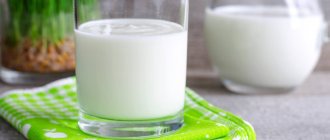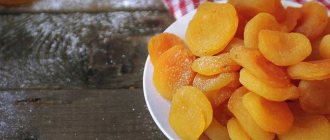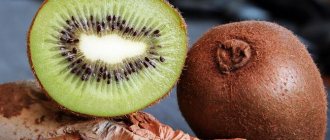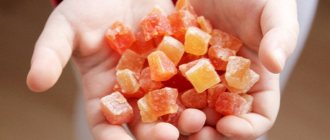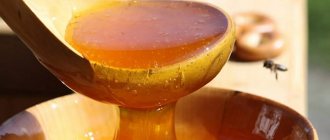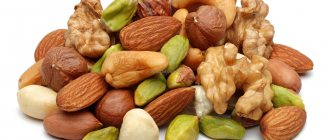Chicory is a plant with a valuable root. It can be found on borders, hills, and by the road. There are 8 types of this herb. Common chicory is especially popular. Entire plantations are dedicated to planting this species. Chicory root is the most popular coffee substitute. It is often chosen by nursing women, as dry roasting gives a similar taste. To understand whether it is possible to drink chicory after childbirth while breastfeeding, you need to analyze the composition of the drink, features and contraindications.
Chicory is a popular coffee substitute used by nursing mothers.
Useful properties of chicory
The root of the plant has a beneficial effect on the body of a nursing woman, as it contains macro- and microelements, vitamins, protein, resins, and amino acids. The healing properties are used in pharmacology and folk medicine. A soluble mixture for preparing a drink is included in the treatment menu for diseases of the cardiovascular system, diabetes, and joint pain.
The root retains its beneficial properties after heat treatment. The product contains vitamins B1, B2, B3, B5, B9, C, carotene. Mineral salts in the raw materials (derivatives of iron, calcium, sodium, manganese, phosphorus) have a positive effect on a woman’s metabolism and appearance.
Useful properties of chicory:
- Natural sugar substitute. The dried root contains from 49 to 75% inulin, a valuable polysaccharide. When interacting with hot water, the substance is converted to fructose. To soften the taste of the drink, you do not need to add a lot of sugar.
- Contains a lot of insoluble fiber, which is a prebiotic - a breeding ground for beneficial bacteria. They cleanse the intestines and also promote the absorption of beneficial elements and the removal of toxins.
- Improves digestion. The root normalizes the production of gastric juice, restores stool, and eliminates dysbacteriosis.
- Relieves joint inflammation. Minerals normalize metabolic processes in the body. Due to this, joint mobility is restored, and the condition of arthrosis, arthritis, and gout improves.
- Has a beneficial effect on the functioning of the gallbladder and liver. Chicory helps break down fats and thins bile.
- Strengthens the walls of blood vessels because it contains ascorbic acid.
- Ensures harmonious functioning of the heart. The drink helps improve well-being with tachycardia and arrhythmia.
Soluble chicory has antiseptic, anti-inflammatory, diuretic, and choleretic effects. When consumed regularly, it stimulates blood flow, reduces blood glucose levels, accelerates skin regeneration, and helps lose weight.
What do we know about chicory?
It looks like a weed that blooms with small purple flowers. The most favorable environment for its existence is meadows and fields. However, the value of this plant lies not in the flowers, but in the root. Because it has many beneficial properties.
Drinking this drink without consulting a doctor for hemorrhoids, varicose veins, gastritis, and vascular diseases is prohibited!
Beneficial features
A seemingly ordinary weed contains many:
- organic acids;
- ascorbic acid;
- pectin;
- vitamins: A, C, B (B1, B2, B3), E, PP;
- inulin;
- carotene;
- mineral salts;
- resins;
- gland;
- calcium;
- potassium;
- magnesium;
- zinc;
- tannins;
- proteins;
- natural sugar (fructose).
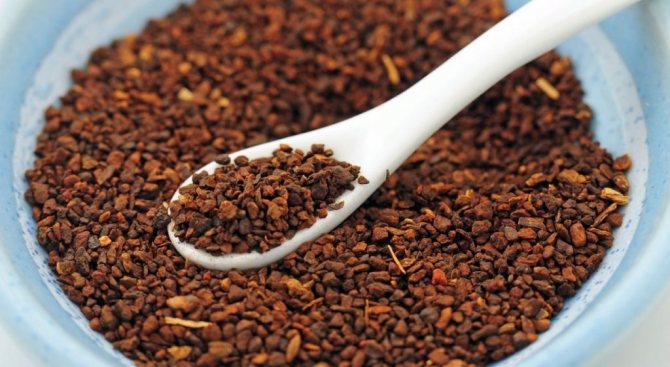
In ancient Rome, this plant was widely used in cooking, especially often used for making salads.
This drink has many beneficial properties:
- due to the lack of caffeine in it, it can help a nursing or pregnant woman eliminate coffee from her diet;
- B vitamins contribute to its beneficial effects on the nervous system. This group of vitamins improves mood and gives energy;
- inulin is especially useful for patients with diabetes, as it helps lower blood sugar levels and neutralizes the harm from sweets;
- stimulates appetite and improves digestion;
- has a mild diuretic, choleretic and antiparasitic effect;
- normalizes metabolism and has an astringent effect;
- has a positive effect on the functioning of the cardiovascular system;
- has an antiseptic and anti-inflammatory effect;
- promotes better growth of hair and nails, and also improves skin condition (due to vitamins A, E, PP);
- has a slight antipyretic and tonic effect;
- helps improve immunity and restore strength;
- prevents iron deficiency anemia and is used for its prevention.
This drink is allowed during breastfeeding, in the absence of contraindications, primarily due to the lack of caffeine in it and the content of many useful substances.
Restrictions on use

Like all drinks, chicory has side properties, the development of which is extremely rare, but which every pregnant woman and nursing mother should be informed about.
It is recommended to use this drink no earlier than three months after birth, although the instructions do not indicate that it is contraindicated during breastfeeding and pregnancy. It is advisable to adhere to this rule so that the baby’s immunity by this time becomes a little stronger and adapts.
Most often, this plant does not cause any harm to the body of the baby and his mother. And the percentage of adverse reactions is about 1 - 3%.
This drink is contraindicated for:
- the presence of urolithiasis in the mother (due to its diuretic effect, it can promote the movement of stones and blockage of blood vessels);
- a tendency to have an allergic reaction and the presence of an allergy to chicory in the mother or baby;
- vascular diseases, varicose veins, hemorrhoids (since it has the ability to thin the blood, which can lead to bleeding);
- the presence of colic in a child or stomach upset in a mother or baby.
During breastfeeding, chicory should be introduced gradually, starting with a couple of sips.
If a nursing woman takes a couple of sips of this drink for the first time after giving birth, then it is necessary to monitor the reaction and general condition of the baby during the day.
Is it possible to drink chicory while breastfeeding?
Doctors have different opinions about drinking the drink during lactation. Some experts believe that the high biological activity of the grass can harm the baby. This applies to children with sensitive digestion and increased excitability. Chicory, like other herbs, can cause an allergic reaction in a child. This is the main risk for the nursing mother and baby.

Most specialists, including Dr. E.O. Komarovsky, they believe that consuming chicory 2-3 times a week while breastfeeding will not harm the baby.
The drink does not contain caffeine. Despite this fact, it should not be introduced into the diet immediately after childbirth. The baby's digestive tract gets used to new conditions by about 3 months of age. During this period, you can try chicory. A negative reaction is expressed by changes in stool, colic, rash, peeling of the skin, and restlessness of the child. These signs may appear within 2 days. If no bad reaction was observed, the product is introduced into the diet.
Negative manifestations are often caused not by chicory itself, but by cow's milk added to the drink.
The effect of chicory on lactation has not been studied. In some women, milk production increases, in others it decreases. Everything here is individual. A woman needs to be guided by her own observations.
Is it possible for a nursing mother?
A coffee drink made from chicory is sold in stores. It is produced by cleaning, heating and roasting the roots of this plant. It contains no caffeine.

But some herbs are dangerous during the lactation period. Therefore, many new mothers have a question about whether it is possible to drink chicory while breastfeeding immediately after delivery.
This drink is not prohibited during lactation. It contains substances that are beneficial for the mother and her baby.
Regular consumption of chicory drink will help a woman get rid of the problem of postpartum constipation. This plant has a beneficial effect on the nervous system of the child and mother, improving sleep and psycho-emotional state, and strengthening the immune system.
But pediatricians do not recommend using chicory during breastfeeding in the first month. At this time, the baby adapts to new living conditions. It is important to adhere to a strict diet during this period. The diet should be simple and safe.
A baby may develop an allergic reaction to chicory: vitamin C is present in high concentrations in this plant.
If the mother is accustomed to drinking a cup of tonic drink in the morning, then she is allowed to try to include chicory in her diet 1-2 months after birth. It is recommended to do a food allergy test first. To do this, you need to brew chicory and drink a tablespoon before feeding the baby. Next, you need to monitor the baby’s condition for two days.
If no negative symptoms occur, then you can gradually increase the serving size. If undesirable reactions occur, the test should be repeated after 1-2 months.
The effect of chicory on the mother's body
Many women find it difficult to give up coffee in the morning, so chicory becomes a substitute for them. The drink invigorates you in the morning and helps relieve fatigue in the evening. Like any warm drink, chicory improves milk flow. If there are no contraindications, a nursing mother will only benefit from using the product.
A drink made from chicory helps during breastfeeding:
- relieve nervous tension;
- strengthen the immune system;
- improve the condition of hair, nails, skin;
- normalize hormonal levels after childbirth;
- lower blood pressure;
- restore the balance of intestinal microflora;
- eliminate constipation;
- normalize metabolism;
- get rid of insomnia.
The plant affects the functioning of the thyroid gland. If a woman has increased synthesis of thyroid-stimulating hormones, the drink will help reduce their production. Some experts note that the root of the plant stimulates menstruation, and as a result, decreased lactation.
Chicory: nutritional properties
With the onset of pregnancy, women have to partially or completely give up coffee. Many expectant mothers have a hard time giving up an invigorating morning drink. After giving birth, life without coffee seems even more difficult. Sleepless nights, loss of energy and vitamin deficiency force you to look for ways to cheer yourself up. To get a stimulating effect comparable to coffee, you can drink chicory.

The chicory drink contains vitamins, acids, polysaccharides, mineral salts, microelements, tannins, proteins and other useful components. The coffee substitute that the mother drinks will also be useful for the baby. The components are absorbed into the blood and partially penetrate into breast milk.
Unlike coffee, chicory does not contain caffeine. It does not excite the nervous system and does not provoke insomnia.
Benefits of the drink for women:
- causes a surge of strength, increases performance;
- strengthens the immune system, helps in the fight against infectious diseases;
- stabilizes the functioning of the nervous system, increases stress resistance and calms;
- improves the functioning of the gastrointestinal tract, stimulates intestinal motility;
- reduces sugar levels;
- has a choleretic and diuretic effect, eliminates swelling and improves the condition of the liver;
- launches metabolic processes and accelerates weight loss;
- has a mild anti-inflammatory and detoxifying effect;
- strengthens blood vessels and stabilizes heart function;
- improves skin condition, strengthens nails and hair.
The herbal remedy is a good prevention of vitamin deficiency, cardiovascular diseases, diabetes, liver and gallbladder pathologies. But women during breastfeeding need to pay attention not only to positive qualities. Any product that a mother uses must be safe for her child.
Contraindications for use
The drink is not recommended for varicose veins, hemorrhoids, gastritis with high acidity, asthma, chronic bronchitis, cholelithiasis. The product is incompatible with cardiac medications. During treatment, the drink is excluded from the diet.
Chicory can cause intolerance in a woman, which is manifested by itching, flaking of the skin, swelling of the throat, and intestinal upset. A negative reaction of the body to the root of the plant is usually observed in women with a pollen allergy (hay fever).
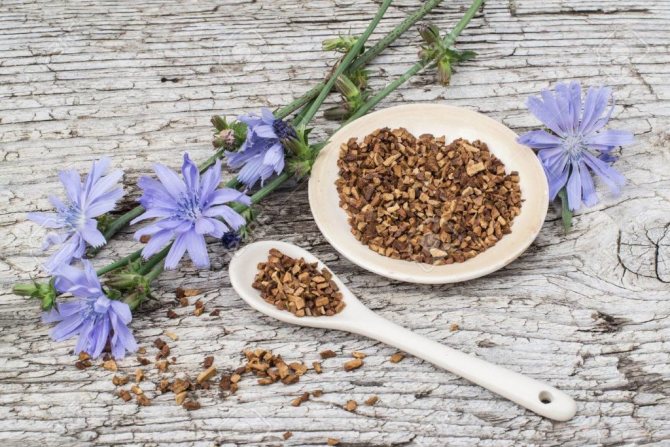
A drink made from freshly ground dried chicory root is considered the most useful, but an instant version is better as a substitute for coffee.
Chicory - what kind of plant is it?
Since ancient times, this plant has been used as a medicine to cleanse the blood and relieve headaches. In Europe, the green leaves of the plant are added to salads, and a drink is made from roasted or crushed roots of the plant.

In modern society, women prefer to consume chicory while breastfeeding in order to increase lactation. Dosed intake of chicory decoctions during breastfeeding has a positive effect on the functioning of the entire body and saturates it with vitamins and microelements.
Chicory roots contain:
- vitamins B1, B2, B3;
- microelements – potassium, magnesium, sodium, iron, phosphorus, calcium;
- vitamins A and C;
- protein;
- organic acids;
- tannins.
Rules for selecting and storing chicory
Chicory is sold in its pure form, or with the addition of ground cereals, spices, berries, herbs or natural coffee. Dried and fried roots are used to prepare the mixture. For a nursing woman, a liquid extract or a product with whole pieces is best suited. It is with this treatment that the plant retains maximum beneficial substances. Whole pieces are crushed with a coffee grinder and brewed.
For coffee lovers, instant chicory is more suitable. It contains fewer nutrients, but tastes more like coffee. The darker the cooking mixture, the higher the degree of roasting and the more pronounced the flavor.
To choose a quality product, you need to pay attention to the composition. If a woman wants to replace coffee with chicory, preference is given to a freeze-dried mixture without additives. The grains in the product (most often barley) add calories to the drink.
Manufacturers often add rose hips, blueberries, and ginseng to the mixture to enhance the taste and benefits. If these are natural ingredients and not flavorings, the healing properties of chicory increase. A product containing preservatives will not be beneficial.
To ensure that the mixture retains its properties after opening the package, you should choose a product packaged in a glass jar or bag with an airtight zipper. This way the powder will not absorb foreign odors or moisture.
Is it possible to eat chicory while breastfeeding?
During feeding, every mother has to exclude familiar foods from her diet, but some of them can easily be replaced. For example, chicory during breastfeeding is an excellent alternative to coffee, which often causes excessive excitement in the baby and sleep disturbances. The health and well-being of the child is largely influenced by what the mother eats. Therefore, it is necessary to figure out whether women can consume chicory or whether it is better to abstain from this product.
Chicory is a plant that grows throughout Europe and parts of Asia with a temperate climate. The roots, leaves and stems of the plant are used in medicine and cooking. To make the drink, which for many serves as a natural coffee substitute, roasted and ground roots are used. Despite heat treatment, the product retains most of the nutrients.
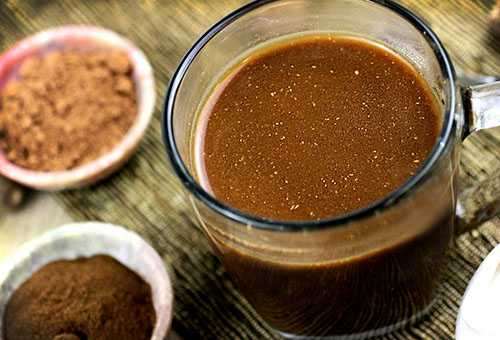
Chicory and lactation
Thanks to chicorine, a bitter substance in the roots of the plant, the chicory drink tastes like coffee to many. Its huge advantage is that it does not contain caffeine. Therefore, in order to exclude coffee from the diet and not limit themselves too strictly, new mothers drink a drink made from chicory.
To date, scientists have not fully studied the effect of the plant on breast milk. Therefore, doctors have different opinions about whether chicory can be consumed by nursing mothers. Some, for example adherents of strict diets, advise limiting yourself to one cup of drink per day or eliminating it altogether. Others see no reason to deny themselves pleasure. Therefore, mom will have to figure out this issue on her own.
The effect of any medicinal plant on the body of mother and baby can be individual. To understand whether it is possible to consume chicory while breastfeeding in your specific case, observe the baby’s reaction to the drink. Start with small portions: one small cup per day will be enough. If the child does not experience an allergic reaction or other side effects, the volume can be safely increased. If, with the introduction of chicory into the diet, you begin to notice any negative changes in your child, stop drinking it for a while until the causes of these changes are identified.
It is important!
The following symptoms will tell you that chicory has a negative effect on the baby’s condition: rash and redness, bowel dysfunction, regurgitation, tearfulness, the appearance of diaper rash and seborrheic crusts on the head. If you notice at least one of these symptoms, this is a reason to refuse the drink.

Rules of use
To prepare a chicory drink yourself, you will have to go to an ecologically clean area to buy the plant, which is not always possible. Fortunately, today you can easily find this product in pharmacies and regular supermarkets. Instant chicory, which is ready to eat, is sold in sealed bags. It is a homogeneous brown powder.
There is also chicory on sale with various natural extracts: sea buckthorn, rose hips, ginseng, ginger, etc. Decide for yourself which one to choose. The most useful and safe product will be without any additives (even natural additives can cause allergies). Please note that the composition does not contain artificial flavors or other substances that are harmful to the health of mother and baby.
It’s very easy to prepare the drink: just pour a glass of boiling water over a teaspoon of powder. Gradually the amount of chicory can be increased to 2 teaspoons. Many people are concerned about how often they are allowed to drink chicory during breastfeeding. Despite all its benefits, do not abuse the drink, especially if the child is under 3 months. If you do not notice external manifestations of the product’s influence on your baby, this does not mean that there are no hidden consequences either. Therefore, try to drink no more than 3-4 cups of chicory per day.
This drink has a specific taste that not everyone can get used to. To soften it, you can add a little sugar, cream or milk. Some people prefer to add honey to their drinks. But this product is a strong allergen, so you need to be extremely careful with it.
Advice
Despite the fact that chicory is allowed for nursing mothers, this product should not be introduced into the diet of children under 1 year of age.

Useful properties of chicory
The root contains almost all the beneficial substances that a plant can accumulate. These are organic acids, pectin, mineral salts, vitamins A, C, E, group B, etc.
Thanks to such a rich composition, the plant has a lot of useful properties that mothers should definitely pay attention to during lactation.
- The product helps normalize digestion, relieves constipation and heartburn, and prevents colic in the baby.
- Stimulates a healthy appetite and speeds up digestive processes. Therefore, you can safely use it if you want to lose extra pounds after childbirth.
- Indicated for the prevention of anemia, atherosclerosis, tachycardia, as it has a positive effect on the heart and vascular system.
- It has a mild diuretic and choleretic effect (especially in combination with rose hips), so it will help get rid of swelling and cleanse the body of toxins.
- The product has a calming effect and helps cope with insomnia. Vitamin B in its composition is responsible for sound sleep, good mood and vigor. Drinking the drink reduces the risk of developing postpartum depression.
- If you have problems with the immune system, you can safely consume chicory, as it has antimicrobial and anti-inflammatory effects. And during viral infections, the decoction even helps lower the temperature.
- Chicory contains insulin, which has a hypoglycemic effect. Therefore, the product can be consumed even by patients with diabetes.

When is it better for a nursing mother to give up chicory?
Unfortunately, the drink is not always healthy and safe. There are not many contraindications, but they still exist. To prevent the product from harming mother and baby, do not forget about them.
- Stomach and duodenal ulcers, gastritis, cholelithiasis.
- Vascular diseases and varicose veins.
- Haemorrhoids.
- Asthma.
- Chicory can have different effects on the nervous system of people, so it is better to avoid it if you are hyperexcitable.
- If you are taking heart medications or any other medications, you should check with your doctor about how chicory will interact with them.
- Individual intolerance.
So, a nursing mother can drink chicory if it does not have any negative effect on her health and the health of the baby. But during lactation, even with this useful product, you need to be careful, especially if you have not used it at all before. If you doubt whether chicory will cause harm specifically in your case, consult a specialist.
The most beloved and long-awaited child was born, and with him EXCESS WEIGHT. But caring for a child does not leave time for oneself or for the gym. And most diets can have dangerous consequences for both mother and baby.
But I really want to put on my favorite dress, heels again and look great as before... There is a way out - stories from moms about how easy it is to lose 20+ KILO!
TheRebenok.ru
Method of use
A teaspoon of granulated root is dissolved in hot water. A little sugar and milk are added to the drink. In the first months of life, a child may react poorly to the mother's consumption of cow's milk, so it is better to replace it with vegetable mixtures. They will soften the bitterness. Oatmeal and rice milk are suitable (for example, from, “Healthy Menu”, etc.).
https://youtu.be/OqqkKFuAWbM
Chicory can be consumed during lactation if the child and woman tolerate this drink well. A large amount of drink during breastfeeding can lead to unpleasant consequences - diarrhea, bloating, hypervitaminosis. Therefore, the main thing is to observe moderation.
Is it possible to drink a drink made from chicory during breastfeeding?
But despite its many positive properties, chicory can be dangerous for women and babies. It is important to remember that the root can provoke a severe allergic reaction, although this happens quite rarely. You will have to give up the drink if you have varicose veins. It should also be taken into account that chicory significantly increases appetite, so a woman should be prepared for the fact that her baby will not be able to eat the usual amount of breast milk.
By and large, there are no other obstacles to drinking a chicory drink, but it is very important to drink it in limited quantities and adhere to certain preparation rules. When the baby reaches three months of age, the woman should try drinking a few sips of hot chicory “coffee” and carefully monitor the baby’s body reaction
If no negative consequences have arisen, then there is absolutely no need to worry.
It is highly not recommended to consume a chicory-based drink more than three times a week. In order to prepare it correctly, just pour one and a half teaspoons of dry powder from the root into a cup and pour boiling water over it, then leave for about five minutes. It is strictly forbidden to add milk to drinks. As is known, this product is dangerous to the baby’s health and, moreover, can neutralize the beneficial properties of chicory, as well as provoke digestive problems.
In conclusion, we can conclude that this hot drink can be drunk during breastfeeding, but only if the baby’s body reacts normally to the new product
When buying powder for making a drink, you need to pay attention to the foreign components in the composition, as they can cause allergies.
